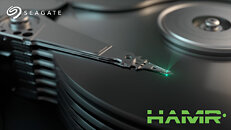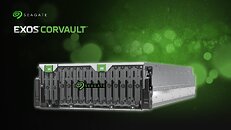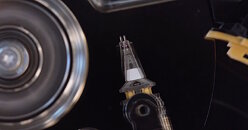T0@st
News Editor
- Joined
- Mar 7, 2023
- Messages
- 2,276 (3.27/day)
- Location
- South East, UK
Seagate has revealed that it has received revenue for Exos Corvault systems during a fourth quarter and fiscal year 2023 conference call—the latest server range is equipped with heat-assisted magnetic recording (HAMR) hard drives. We heard about evaluation samples being sent out to an important data center client around Spring time, but fresh corporate announcements have revealed that the first commercial HAMR-based systems have been picked up by paying customers. Gianluca Romano, the firm's chief financial officer stated: "Importantly, we shipped our first HAMR-based CORVAULT system for revenue as planned during the June quarter. We expect broader availability of these CORVAULT systems by the end of calendar 2023."
Seagate's chief executive, Dave Mosley, also revealed that higher capacity HAMR-based nearline hard drives have been sent out for testing in the field. He boasts that this was achieved during corporate cost cutting initiatives: "We reduced production output by approximately 25% compared with peak volume in order to drive better supply/demand dynamics and enhance profitability as the markets recover. And all of these accomplishments were made while delivering on our 30 TB+ HAMR product development and qualification milestones with volume ramp on track to begin in early calendar 2024...Initial customer qualifications are progressing well. We are on track to begin volume ramp in early calendar 2024. We are also preparing qualifications with a broader number of customers, including testing for lower capacity drives targeting VIA and enterprise OEM workloads." He also outlined plans to keep PMR and SMR hard drive technologies alive for another generation: "Development efforts on what may be our last PMR product are nearing completion and will extend drive capacities into the mid- to upper 20 TB range." Clients who are reluctant to jump onto HAMR could be offered some alternatives—24 TB+ models based on PMR+TDMR and SMR+TDMR configurations are roadmapped for release by the end of the year.



Seagate Technology's blurb states: "While data creation is growing exponentially, IT teams and budgets are not. That's why we built Exos CORVAULT. As a set-and-forget solution, you can store mass data with less human intervention. The system heals itself on the fly thanks to Seagate Autonomous Drive Regeneration (ADR). That means fewer opportunities for human error and more cost savings."
Learn more here.
View at TechPowerUp Main Site | Source
Seagate's chief executive, Dave Mosley, also revealed that higher capacity HAMR-based nearline hard drives have been sent out for testing in the field. He boasts that this was achieved during corporate cost cutting initiatives: "We reduced production output by approximately 25% compared with peak volume in order to drive better supply/demand dynamics and enhance profitability as the markets recover. And all of these accomplishments were made while delivering on our 30 TB+ HAMR product development and qualification milestones with volume ramp on track to begin in early calendar 2024...Initial customer qualifications are progressing well. We are on track to begin volume ramp in early calendar 2024. We are also preparing qualifications with a broader number of customers, including testing for lower capacity drives targeting VIA and enterprise OEM workloads." He also outlined plans to keep PMR and SMR hard drive technologies alive for another generation: "Development efforts on what may be our last PMR product are nearing completion and will extend drive capacities into the mid- to upper 20 TB range." Clients who are reluctant to jump onto HAMR could be offered some alternatives—24 TB+ models based on PMR+TDMR and SMR+TDMR configurations are roadmapped for release by the end of the year.



Seagate Technology's blurb states: "While data creation is growing exponentially, IT teams and budgets are not. That's why we built Exos CORVAULT. As a set-and-forget solution, you can store mass data with less human intervention. The system heals itself on the fly thanks to Seagate Autonomous Drive Regeneration (ADR). That means fewer opportunities for human error and more cost savings."
Learn more here.
View at TechPowerUp Main Site | Source




